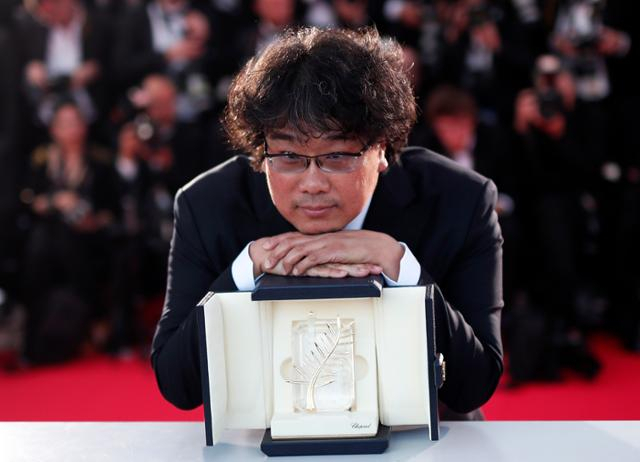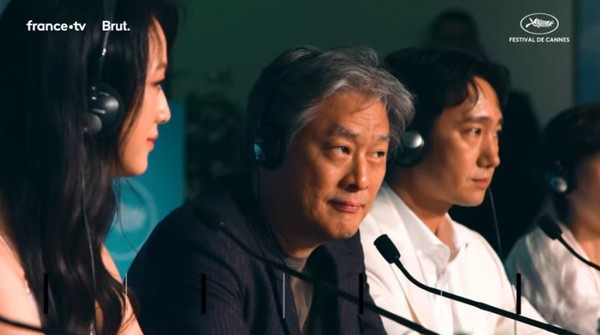 |
Director Bong Joon-ho poses with Palme d’Or at the Cannes Film Festival in 2019. (EPA-Yonhap) |
Global attention for Korean cinema reached a peak when director Bong Joon-ho won the Palme d’Or at the Cannes Film Festival for his darkly comic thriller “Parasite” in 2019.
He was the first Korean director to win the top award at Cannes, after last appearing in competition with “Okja” (2017). He was also the second Asian winner in consecutive years, following Japanese director Hirokazu Kore-eda’s triumph with “Shoplifters” (2018).
After skipping a year in 2020 due to the COVID-19 pandemic, the Cannes festival returned on a much smaller scale in 2021 and the prestigious film festival returned fully in 2022.
And at the center in 2022 was director Park Chan-wook, who grabbed the best director award with his 11th project, romance-thriller “Decision to Leave.” Song Kang-ho of “Broker” was named best actor the same year, bringing two trophies to Korea.
 |
Director Park Chan-wook of “Decision to Leave” during the 75th Cannes Film Festival last year. (Cannes Film Festival) |
Juxtaposed against the success of Korean films in previous editions of the festival, this year saw no films from Korea in the main competition.
For quite some time, Korean films have been easy to find at Cannes. Directors Lee Chang-dong, Hong Sang-soo, Im Sang-soo, Bong Joon-ho and Park Chan-wook have consistently showcased works that grabbed Cannes’ attention.
Why is there no successor to “Parasite” or “Decision to Leave”?
It really has to do with the Korean filmmaking industry that is still reeling from the pandemic.
South Korean cinemas have been slow to recover from the pandemic. Dried-up investment and increased ticket prices, citing inflation, are at the center of it. This has led star filmmakers to turn to streaming platforms as an alternative, finding no concrete reason to push for a theatrical release.
Currently, Bong is shooting American sci-fi drama series “Mickey 17” with “The Batman” star Robert Pattinson, while Park is focusing on the production of black comedy series “The Sympathizer,” another US production, slated for a 2024 release on HBO.
Yet Cannes still takes a conservative stand on streaming films and dramas, as do many other festivals. The last time a Netflix original was screened at Cannes was director Bong Joon-ho’s “Okja” (2017), mainly on the back of his previous feats at Cannes.
This year’s Cannes invited just one streaming platform-based film. Apple Studios-produced and Martin Scorsese-directed “Killers of the Flower Moon” made it to the noncompetition category. The film will stream on Apple TV+ and open in cinemas in October via Paramount.
Some say that smash-hit series “Squid Game” on Netflix has encouraged filmmakers to venture into the lucrative world of streaming, where they do not have to worry about attracting investment. The profit-sharing structure is also somewhat assuring.
In the world of streaming, directors can forget about the breakeven point. Global interest in Korean films directly translates into sales for the platform sales and profit for the creators.
In April, Netflix said that “The Glory” was the biggest factor behind its better-than-expected 3.7 percent on-year increase in sales, raking in a whopping $8.1 billion.
Based on Korean Film Council data, some 90 Korean films that have received at least 5 billion to 10 billion won in investment have yet to be released. These films are looking for the “right timing” for theatergoers to return to cinemas. But for now, it still looks elusive for the local film industry to create a “virtuous cycle” of money flow and investment for production of high-quality films to compete on the global stage.
It’s a shame that director Kim Jee-woon’s much-anticipated black comedy “Cobweb” failed to enter the competition category at this year’s Cannes, screening out of competition. It is his third time participating outside of competition, following 2005’s “A Bittersweet Life” and 2008’s “The Good, The Bad, the Weird.”
Kim’s previous work was, by the way, also a drama series on Apple TV+, “Dr. Brain” (2021).
 |
Teaser for Kim Jee-woon’s “Cobweb” (Cannes Film Festival) |







